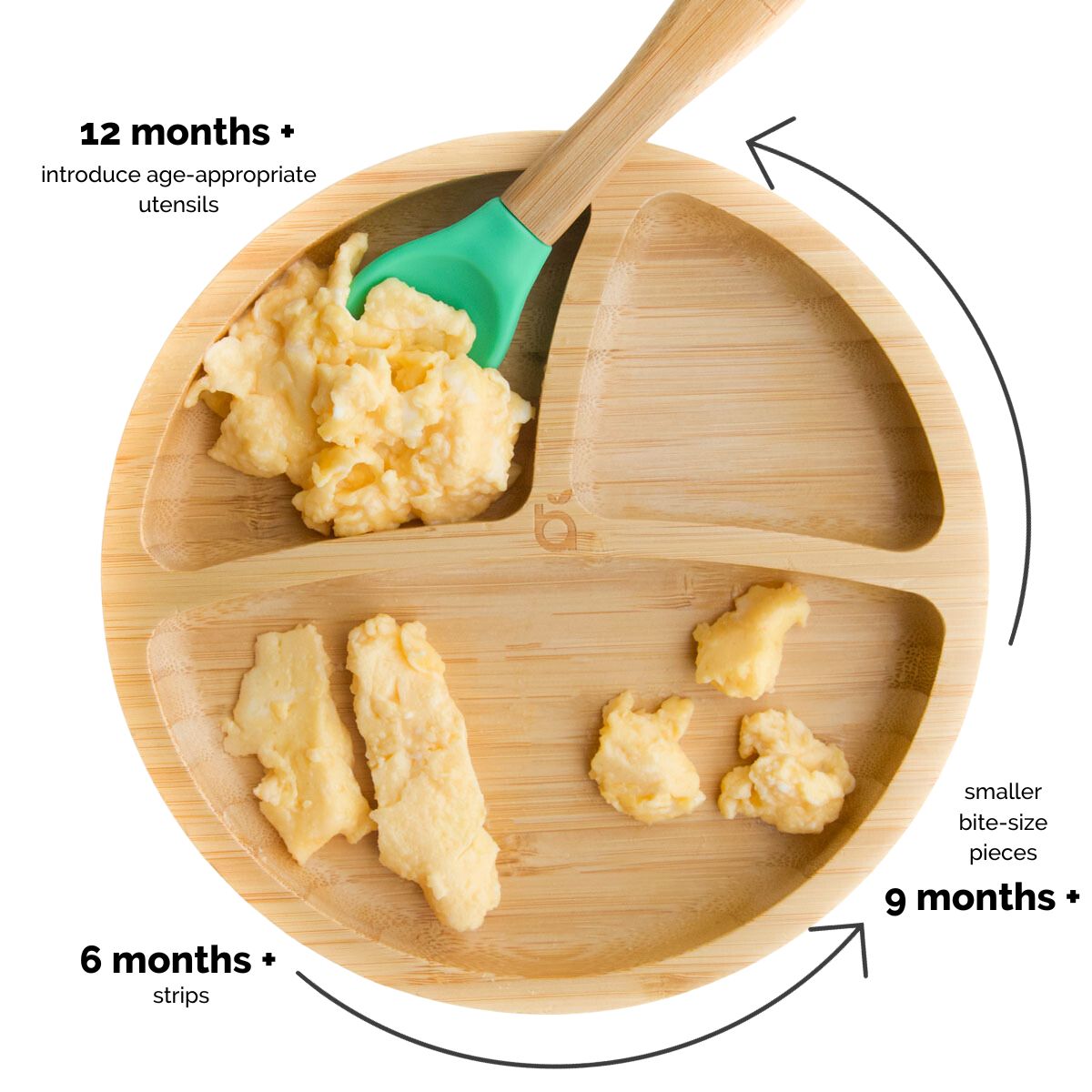Can Babies Have Scrambled Eggs?

Yes, babies can have scrambled eggs. Introduce eggs after six months, monitoring for any allergic reactions.
Eggs are a nutritious food, rich in protein and essential vitamins. Introducing scrambled eggs to a baby’s diet can provide vital nutrients for growth. Start with well-cooked, soft scrambled eggs to ensure easy digestion. Avoid adding salt, butter, or seasoning to keep it healthy.
Always observe for signs of allergies, such as rashes or digestive issues. Consulting a pediatrician before introducing new foods is advisable. Eggs can be a versatile and beneficial addition to a baby’s expanding diet. Properly cooked scrambled eggs can support a baby’s development and introduce them to new textures and flavors.

Credit: www.mjandhungryman.com
Introducing Eggs To Babies
Many parents wonder when to introduce eggs to their babies. Eggs are nutritious and can be a great addition to your baby’s diet. Understanding the right age and benefits can help make this transition smoother.
Ideal Age For Egg Introduction
Pediatricians often recommend introducing eggs at around 6 months of age. By this time, babies are usually ready for solid foods. Start with the yolk first as it is easier to digest.
If there are no allergic reactions, you can introduce the egg white. Always watch for any signs of allergies like rashes or swelling.
Benefits Of Eggs For Infants
Eggs are packed with essential nutrients that support a baby’s growth. They are rich in proteins, which help in muscle development. Eggs also contain vitamins like Vitamin A, D, and E.
These vitamins are vital for good vision, bone health, and immune function. Eggs provide choline, which is important for brain development. They also offer healthy fats that are necessary for overall growth.
Here is a quick summary of the benefits:
- High in protein for muscle growth
- Rich in essential vitamins
- Supports brain development with choline
- Provides healthy fats

Credit: www.egginfo.co.uk
Preparing Scrambled Eggs For Babies
Introducing scrambled eggs to your baby can be a delightful experience. Eggs are rich in protein and essential nutrients. Proper preparation ensures they are safe and easy to digest. Below are some key steps and tips to make scrambled eggs baby-friendly.
Ingredients And Texture Modifications
Babies need soft, easy-to-eat textures. Follow these guidelines to prepare scrambled eggs:
- Ingredients: Use fresh eggs, water, or breast milk/formula.
- Texture: Ensure the eggs are well-cooked and soft.
Here’s a simple recipe:
| Ingredients | Quantity |
|---|---|
| Fresh Eggs | 1-2 |
| Water or Milk | 1-2 tablespoons |
- Crack the eggs into a bowl.
- Add water or milk and whisk until smooth.
- Cook on low heat, stirring constantly.
Safe Cooking Practices
Ensuring safety is crucial. Follow these steps:
- Cook thoroughly: Eggs should be fully cooked to avoid bacteria.
- Use low heat: Low heat prevents overcooking and maintains softness.
- Stir continuously: Constant stirring ensures even cooking and a soft texture.
- Avoid added salt: Babies do not need extra sodium.
Serve the scrambled eggs warm, not hot. Ensure they are easy for your baby to handle and digest. Following these tips will make introducing scrambled eggs a smooth and enjoyable process for both you and your baby.
Allergies And Dietary Considerations
Introducing scrambled eggs to your baby can be exciting. But, it is essential to consider allergies and dietary needs. Babies have sensitive systems. Knowing how to identify an allergy is crucial. Here, we explore important aspects of introducing eggs to your baby’s diet.
Identifying Egg Allergies
Egg allergies are common in babies. Watch for signs like:
- Rashes or hives
- Swelling of the face, lips, or tongue
- Vomiting or diarrhea
- Difficulty breathing
If you notice any of these symptoms, stop feeding eggs. Contact your pediatrician immediately. They may suggest an allergy test. Always introduce new foods one at a time. This helps you pinpoint any allergies.
Egg Alternatives For Sensitive Infants
If your baby shows signs of an egg allergy, consider these alternatives:
| Alternative | Benefits |
|---|---|
| Mashed Bananas | Rich in vitamins and easy to digest |
| Avocado | High in healthy fats and nutrients |
| Pureed Vegetables | Provides essential vitamins and fiber |
| Oatmeal | Good source of iron and fiber |
These alternatives ensure your baby gets essential nutrients. They are also less likely to cause an allergic reaction. Always monitor your baby closely when introducing new foods.

Credit: www.healthylittlefoodies.com
Frequently Asked Questions
How Do I Give My 7 Month Old Scrambled Eggs?
Scramble one egg without adding salt or spices. Cook until fully set. Let it cool and cut into small pieces. Serve to your baby.
How To Prepare An Egg For A 7 Month Old?
Boil or scramble the egg until fully cooked. Mash or chop into small pieces. Serve plain or mixed with veggies.
Can My Baby Eat Scrambled Eggs With No Teeth?
Yes, babies can eat scrambled eggs with no teeth. Ensure the eggs are soft and well-cooked for easy swallowing.
Can We Give An Egg To A 7 Month Old Baby?
Yes, you can give a 7-month-old baby cooked eggs. Start with small amounts to check for allergies.
Can Babies Eat Scrambled Eggs?
Yes, babies can eat scrambled eggs. Start offering them around six months old.
Conclusion
Offering scrambled eggs to babies can be a nutritious choice. Always consult your pediatrician first. Introduce eggs gradually, watching for allergies. Ensure they are fully cooked and served in small, manageable pieces. With proper care, scrambled eggs can be a healthy addition to your baby’s diet.
Happy feeding!
